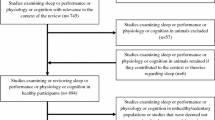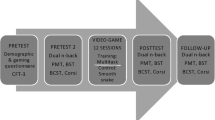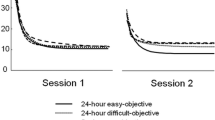Abstract
Background
Physical exercise has been shown to improve cognitive and neural functioning in older adults.
Aims and methods
The current study compared the effects of an acute bout of physical exercise with a bout of interactive mental and physical exercise (i.e., “exergaming”) on executive (Stroop) task performance and event-related potential (ERP) amplitudes in younger and older adults.
Results
Results revealed enhanced executive task performance in younger and older adults after exercise, with no differences in performance between exercise conditions. Stroop (RT) performance in older adults improved more than in younger adults from pre- to post-exercise. A significant increase in EEG amplitude from pre- to post-exercise was found at the Cz site from 320 to 700 ms post-stimulus for both younger and older adults, with older adults demonstrating a larger Stroop interference effect. While younger adults exhibited overall greater EEG amplitudes than older adults, they showed no differences between congruent and incongruent trials (i.e., minimal interference). Compared to peers with higher BMI (body mass index), older adults with lower BMI showed a greater reduction in Stroop interference effects from pre- to post-exercise.
Discussion and conclusions
The beneficial effects of an acute bout of physical exercise on cognitive and neural functioning in younger and older adults were confirmed, with no difference between standard exercise and exergaming. Findings suggest that BMI, sometimes used as a proxy for fitness level, may modulate benefits that older adults derive from an acute bout of exercise. Findings have implications for future research that seeks to investigate unique effects of exergaming when compared to standard physical exercise.






Similar content being viewed by others
References
Bishop NA, Lu T, Yankner BA (2010) Neural mechanisms of ageing and cognitive decline. Nature 464:529–535
Erickson KI, Voss MW, Prakash RS et al (2011) Exercise training increases size of hippocampus and improves memory. Proc Natl Acad Sci U S A 108:3017–3022
Kramer AF, Erickson KI, Colcombe SJ (2006) Exercise, cognition, and the aging brain. J Appl Physiol 101:1237–1242
Colcombe S, Kramer AF (2003) Fitness effects on the cognitive function of older adults a meta-analytic study. Psychol Sci 14:125–130
Stroth S, Kubesch S, Dieterle K et al (2009) Physical fitness, but not acute exercise modulates event-related potential indices for executive control in healthy adolescents. Brain Res 1269:114–124
Chang YK, Labban J, Gapin J et al (2012) The effects of acute exercise on cognitive performance: a meta-analysis. Brain Res 1453:87–101
Puccioni O, Vallesi A (2012) Conflict resolution and adaptation in normal aging: the role of verbal intelligence and cognitive reserve. Psychol Aging 27:1018
West R, Alain C (2000) Age-related decline in inhibitory control contributes to the increased Stroop effect observed in older adults. Psychophysiology 37:179–189
West R, Moore K (2005) Adjustments of cognitive control in younger and older adults. Cortex 41:570–581
Anderson-Hanley C, Arciero PJ, Brickman AM et al (2012) Exergaming and older adult cognition: a cluster randomized clinical trial. Am J Prev Med 42:109–119
Maillot P, Perlot A, Hartley A (2012) Effects of interactive physical-activity video-game training on physical and cognitive function in older adults. Psychol Aging 27:589–600
Badzakova-Trajkov G, Barnett KJ, Waldie KE et al (2009) An ERP investigation of the Stroop task: the role of the cingulate in attentional allocation and conflict resolution. Brain Res 1253:139–148
Liotti M, Woldorff MG, Perez R et al (2000) An ERP study of the temporal course of the Stroop color-word interference effect. Neuropsychologia 38:701–711
Hogan M, Kiefer M, Kubesch S et al (2013) The interactive effects of physical fitness and acute aerobic exercise on electrophysiological coherence and cognitive performance in adolescents. Exp Brain Res 229:85–96
Chodzko-Zajko WJ, Proctor DN, Fiatarone Singh MA et al (2009) American College of Sports Medicine Position stand. Exercise and physical activity for older adults. Med Sci Sports Exerc 41:1510–1530. doi:10.1249/MSS.0b013e3181a0c95c
Kerns JG, Cohen JD, MacDonald AW et al (2004) Anterior cingulate conflict monitoring and adjustments in control. Science 303:1023–1026
Gratton G, Coles MG, Donchin E (1983) A new method for off-line removal of ocular artifact. Electroencephalogr Clin Neurophysiol 55:468–484
Hyodo K, Dan I, Suwabe K et al (2012) Acute moderate exercise enhances compensatory brain activation in older adults. Neurobiol Aging 33:2621–2632
Yanagisawa H, Dan I, Tsuzuki D et al (2010) Acute moderate exercise elicits increased dorsolateral prefrontal activation and improves cognitive performance with Stroop test. Neuroimage 50:1702–1710
O’Leary KC, Pontifex MB, Scudder MR et al (2011) The effects of single bouts of aerobic exercise, exergaming, and videogame play on cognitive control. Clin Neurophysiol 122:1518–1525
Robert G, Hockey J (1997) Compensatory control in the regulation of human performance under stress and high workload: a cognitive-energetical framework. Biol Psychol 45:73–93
Tsai CL, Chen FC, Pan CY et al (2014) Impact of acute aerobic exercise and cardiorespiratory fitness on visuospatial attention performance and serum BDNF levels. Psychoneuroendocrinology 41:121–131
Author information
Authors and Affiliations
Corresponding author
Ethics declarations
Conflict of interest
On behalf of all authors, the corresponding author states that there is no conflict of interest.
Statement on Human Rights
All procedures performed in studies involving human participants were in accordance with the ethical standards of the institutional and/or national research committee and with the 1964 Helsinki declaration and its later amendments or comparable ethical standards.
Informed Consent
Informed consent was obtained from all individual participants included in the study.
Rights and permissions
About this article
Cite this article
Dimitrova, J., Hogan, M., Khader, P. et al. Comparing the effects of an acute bout of physical exercise with an acute bout of interactive mental and physical exercise on electrophysiology and executive functioning in younger and older adults. Aging Clin Exp Res 29, 959–967 (2017). https://doi.org/10.1007/s40520-016-0683-6
Received:
Accepted:
Published:
Issue Date:
DOI: https://doi.org/10.1007/s40520-016-0683-6




